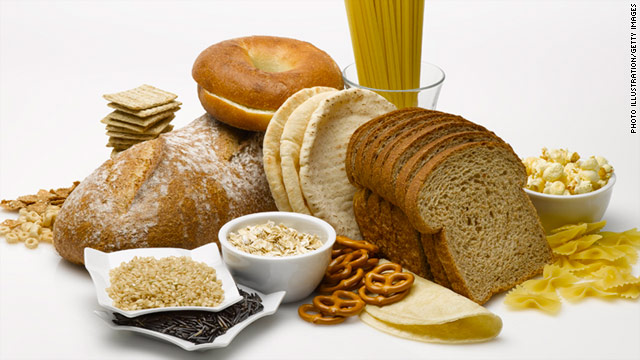What runners need to know before giving up wheat
Image: Joy Skipper
As the gluten-free trend has become more popular, many runners can't help but wonder if it's something they should try. After all, the diet has helped some elites—including Amy Yoder Begley and Stephanie Rothstein—boost their running performance. Could it do the same for you? Here's what you need to know before kissing your beloved bagels and pasta good-bye.
Is GF for you?
For runners with celiac disease (including Yoder Begley and Rothstein), gluten—a protein in wheat and related grains—damages the intestines, causing pain, bloating, fatigue, and bone loss. It affects one percent of the population. But the growing use of new wheat varieties—many with forms of gluten that are more difficult to digest—may be a reason why "gluten sensitivity" appears to be on the rise. While it's not a well-defined condition, it seems to cause many of the same symptoms as celiac disease but doesn't damage the GI tract.
An Energy Boost
Some healthy runners say they feel more energerized after giving up gluten. This is usually the result of cutting out processed foods, which often contain gluten, and eating more vegetables, fruits, and nonwheat whole grains. But because many foods with gluten, such as certain whole grains, are a valuable source of nutrients, runners shouldn't make the switch unless they're diagnosed with celiac disease or gluten sensitivity.
How to Go GF
You'll need to avoid more than pizza, pasta, and bread. Many unexpected foods, like ice cream, soups, and sauces, contain forms of gluten, like wheat starch or hydrolyzed wheat protein, so closely read all ingredients. Also review the allergens printed below the Nutrition Facts panel; if a product contains wheat, it will be listed there. While there's no official gluten-free label for packaged foods, the FDA has proposed a voluntary label for foods with fewer than 20 parts per million (ppm) of gluten. This constitutes virtually zero traces, making the food tolerable for celiacs. It's not clear, however, what amount of gluten (if any) people with a sensitivity can handle.
Fast Food
Fuel up and recover without gluten
Prerun: Fruit salad and Greek yogurt; almond butter on potato-flour toast. Why? Provides quick carbs and a bit of protein.
Postrun: Quinoa pasta, salmon, and asparagus. Why? Packed with inflammation-reducing omegas and antioxidants.
Carb Up: Wheat-Free Energy
Amaranth: More protein than many grains.
Corn: Easy to digest and provides iron.
Millet: Magnesium helps energy metabolism.
Oats: Gluten-free but some celiacs can't tolerate the protein in oats.
Potatoes: Potassium boosts circulation.
Quinoa: Manganese aids in muscle recovery.
Rice: Contains both iron and B vitamins.
Is GF for you?
For runners with celiac disease (including Yoder Begley and Rothstein), gluten—a protein in wheat and related grains—damages the intestines, causing pain, bloating, fatigue, and bone loss. It affects one percent of the population. But the growing use of new wheat varieties—many with forms of gluten that are more difficult to digest—may be a reason why "gluten sensitivity" appears to be on the rise. While it's not a well-defined condition, it seems to cause many of the same symptoms as celiac disease but doesn't damage the GI tract.
An Energy Boost
Some healthy runners say they feel more energerized after giving up gluten. This is usually the result of cutting out processed foods, which often contain gluten, and eating more vegetables, fruits, and nonwheat whole grains. But because many foods with gluten, such as certain whole grains, are a valuable source of nutrients, runners shouldn't make the switch unless they're diagnosed with celiac disease or gluten sensitivity.
How to Go GF
You'll need to avoid more than pizza, pasta, and bread. Many unexpected foods, like ice cream, soups, and sauces, contain forms of gluten, like wheat starch or hydrolyzed wheat protein, so closely read all ingredients. Also review the allergens printed below the Nutrition Facts panel; if a product contains wheat, it will be listed there. While there's no official gluten-free label for packaged foods, the FDA has proposed a voluntary label for foods with fewer than 20 parts per million (ppm) of gluten. This constitutes virtually zero traces, making the food tolerable for celiacs. It's not clear, however, what amount of gluten (if any) people with a sensitivity can handle.
Fast Food
Fuel up and recover without gluten
Prerun: Fruit salad and Greek yogurt; almond butter on potato-flour toast. Why? Provides quick carbs and a bit of protein.
Postrun: Quinoa pasta, salmon, and asparagus. Why? Packed with inflammation-reducing omegas and antioxidants.
Carb Up: Wheat-Free Energy
Amaranth: More protein than many grains.
Corn: Easy to digest and provides iron.
Millet: Magnesium helps energy metabolism.
Oats: Gluten-free but some celiacs can't tolerate the protein in oats.
Potatoes: Potassium boosts circulation.
Quinoa: Manganese aids in muscle recovery.
Rice: Contains both iron and B vitamins.

No comments:
Post a Comment